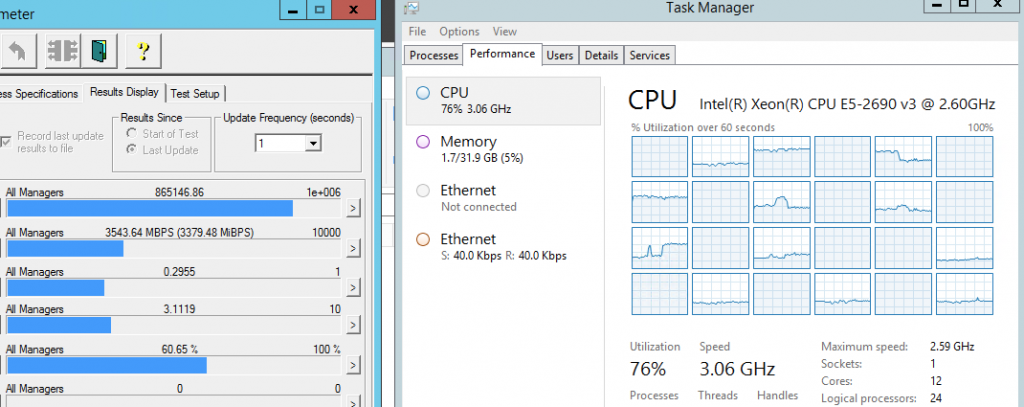REPORT ANALYSIS AND FINAL THOUGHTS
Before we get into the conclusion, we would like to mention one last thing in relation to the Intel SSD DC P3608’s performance. While we didn’t see the SSD meet the spec of 850K IOPS in our charts, we were able to see 4KB read at over 865K IOPS during our testing. So, it is indeed capable of reaching its rated performance specifications.
 An interesting thing to note is that while reading at such high speeds our CPU usage was around 60% in Iometer and 76% overall in Windows task manager with our Intel Xeon E5-2690 v3 CPU. A single drive is actually capable of almost full utilization of our 12-core test bench CPU! This just goes to show that now with NVMe, the CPU can potentially become the bottleneck rather than the storage device, and when planning out deployment of equipped servers, one needs to take this into consideration.
An interesting thing to note is that while reading at such high speeds our CPU usage was around 60% in Iometer and 76% overall in Windows task manager with our Intel Xeon E5-2690 v3 CPU. A single drive is actually capable of almost full utilization of our 12-core test bench CPU! This just goes to show that now with NVMe, the CPU can potentially become the bottleneck rather than the storage device, and when planning out deployment of equipped servers, one needs to take this into consideration.
Now, let’s wrap this up.
The Intel SSD DC P3608 is the fastest SSD in Intel’s portfolio and the fastest SSD we have tested to date. With sequential speeds of up to 5GB/s read and 3GB/s write as well as reaching over 850K/150K IOPS read/write, it delivers performance that is sure to impress anyone. With a low three drive write per day endurance rating, it cannot keep up with the P3700 if you need something for heavy write workloads, but if you are after high capacity and performance, more specifically read performance, this is the drive for the job.
In testing, this SSD excelled across the board, in both single volume and RAID 0 configurations. Throughput scaling was almost double in all QDs when the dual volumes were setup in RAID 0. Although, in this configuration the drive will present a reliability issue, just a second controller alone is just another point of failure and a RAID 0 configuration would need to be accounted for in deployment measures.
Looking at our server workload profiles, this drive demonstrated great potential. The Intel SSD DC P3608 is a prime candidate to help consolidate servers and lower TCO for visualization applications. It even has the grunt to meet the demands of databases, big data analytics, and high performance computing operations. With an extensive list of data integrity and reliability features, from end-to-end data protection and LDPC engine to its ease of manageability, the Intel SSD DC P3608 will not let you down.
All of this is possible thanks to Intel’s engineering and the NVMe host controller interface. With such high throughput, low latency, and the ability to keep CPU cycles down to a minimum, this is what the drive was meant for. NVMe is bringing PCIe SSDs into the mainstream so that everyone can reap the rewards.
FINAL THOUGHTS
Overall, as you can probably tell, we are quite excited to see the performance that the Intel SSD DC P3608 was able to deliver. For $2.19 per GB and capacities up to 4TB, Intel has set up this SSD to be one heck of a deal. Although, competition is heating up. Just yesterday we saw a preview of Samsung’s new PM1725 which promises to offer similar performance and endurance while providing a higher 6.4TB capacity. Not only that, there are currently other solutions to consider when looking into purchasing high performance NVMe PCIe SSDs for your deployment. Be sure to keep up with us as we start looking into these other options, things are going to start to getting interesting.
Just as the Intel SSD DC P3700, we would like to award the Intel SSD DC P3608 our Editor’s Choice award due to its great performance and price point.
 The SSD Review The Worlds Dedicated SSD Education and Review Resource |
The SSD Review The Worlds Dedicated SSD Education and Review Resource | 

Random adjectives, desperate efforts to “humanize” the tech resulted in this huge review to contain next to no information at all.
There is no easy way to say this: software RAID 0 on PCIe is simply retarded.
Thanks for your thoughts
Now just make it affordable
Well, for enterprise it is very affordable for what you get. If you are concerned about consumers/enthusiasts I can see where you are coming from, but this is not meant for them. Next year, however, we may be seeing performance like this trickle down.
More than likely next year
As an enterprise product I can see it as a high-end workstation device but not a server device. The lack of RAIDability seems to limit its use to caching and high-speed scratch work area.
I’ve been informed that PCIe hardware RAID will be available on the Skylake CPU and the Xeon version when it comes out later. Now we’re talking………
so this is a preview, not a review… where are the comparisons to P3700 and PM951?
I don’t have access to those drives. We reviewed the P3700 in another system. Because of that as well as a change in our testing methodology, we cant not graph them side by side. Looking at the P3700’s specific review you can gauge for yourself the approximate performance difference between the two.